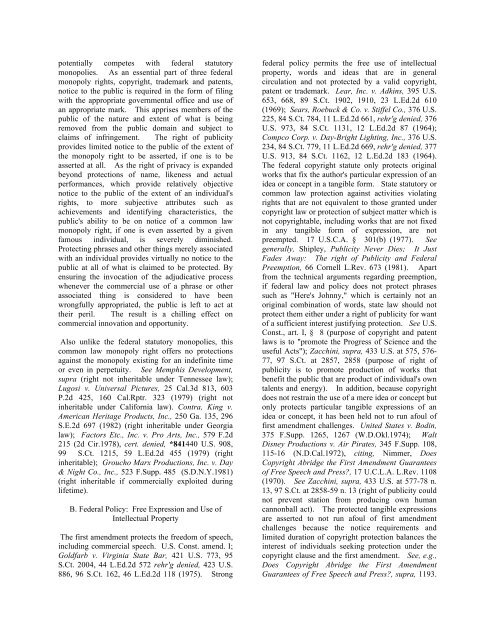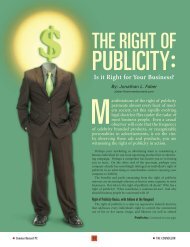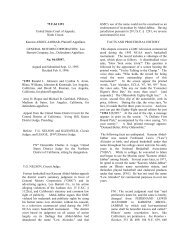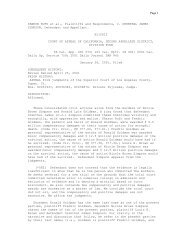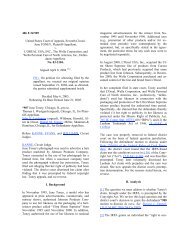Johnny Carson v. Here's Johnny Portable Toilets ... - Right Of Publicity
Johnny Carson v. Here's Johnny Portable Toilets ... - Right Of Publicity
Johnny Carson v. Here's Johnny Portable Toilets ... - Right Of Publicity
Create successful ePaper yourself
Turn your PDF publications into a flip-book with our unique Google optimized e-Paper software.
potentially competes with federal statutorymonopolies. As an essential part of three federalmonopoly rights, copyright, trademark and patents,notice to the public is required in the form of filingwith the appropriate governmental office and use ofan appropriate mark. This apprises members of thepublic of the nature and extent of what is beingremoved from the public domain and subject toclaims of infringement. The right of publicityprovides limited notice to the public of the extent ofthe monopoly right to be asserted, if one is to beasserted at all. As the right of privacy is expandedbeyond protections of name, likeness and actualperformances, which provide relatively objectivenotice to the public of the extent of an individual'srights, to more subjective attributes such asachievements and identifying characteristics, thepublic's ability to be on notice of a common lawmonopoly right, if one is even asserted by a givenfamous individual, is severely diminished.Protecting phrases and other things merely associatedwith an individual provides virtually no notice to thepublic at all of what is claimed to be protected. Byensuring the invocation of the adjudicative processwhenever the commercial use of a phrase or otherassociated thing is considered to have beenwrongfully appropriated, the public is left to act attheir peril. The result is a chilling effect oncommercial innovation and opportunity.Also unlike the federal statutory monopolies, thiscommon law monopoly right offers no protectionsagainst the monopoly existing for an indefinite timeor even in perpetuity. See Memphis Development,supra (right not inheritable under Tennessee law);Lugosi v. Universal Pictures, 25 Cal.3d 813, 603P.2d 425, 160 Cal.Rptr. 323 (1979) (right notinheritable under California law). Contra, King v.American Heritage Products, Inc., 250 Ga. 135, 296S.E.2d 697 (1982) (right inheritable under Georgialaw); Factors Etc., Inc. v. Pro Arts, Inc., 579 F.2d215 (2d Cir.1978), cert. denied, *841440 U.S. 908,99 S.Ct. 1215, 59 L.Ed.2d 455 (1979) (rightinheritable); Groucho Marx Productions, Inc. v. Day& Night Co., Inc., 523 F.Supp. 485 (S.D.N.Y.1981)(right inheritable if commercially exploited duringlifetime).B. Federal Policy: Free Expression and Use ofIntellectual PropertyThe first amendment protects the freedom of speech,including commercial speech. U.S. Const. amend. I;Goldfarb v. Virginia State Bar, 421 U.S. 773, 95S.Ct. 2004, 44 L.Ed.2d 572 rehr'g denied, 423 U.S.886, 96 S.Ct. 162, 46 L.Ed.2d 118 (1975). Strongfederal policy permits the free use of intellectualproperty, words and ideas that are in generalcirculation and not protected by a valid copyright,patent or trademark. Lear, Inc. v. Adkins, 395 U.S.653, 668, 89 S.Ct. 1902, 1910, 23 L.Ed.2d 610(1969); Sears, Roebuck & Co. v. Stiffel Co., 376 U.S.225, 84 S.Ct. 784, 11 L.Ed.2d 661, rehr'g denied, 376U.S. 973, 84 S.Ct. 1131, 12 L.Ed.2d 87 (1964);Compco Corp. v. Day-Bright Lighting, Inc., 376 U.S.234, 84 S.Ct. 779, 11 L.Ed.2d 669, rehr'g denied, 377U.S. 913, 84 S.Ct. 1162, 12 L.Ed.2d 183 (1964).The federal copyright statute only protects originalworks that fix the author's particular expression of anidea or concept in a tangible form. State statutory orcommon law protection against activities violatingrights that are not equivalent to those granted undercopyright law or protection of subject matter which isnot copyrightable, including works that are not fixedin any tangible form of expression, are notpreempted. 17 U.S.C.A. § 301(b) (1977). Seegenerally, Shipley, <strong>Publicity</strong> Never Dies; It JustFades Away: The right of <strong>Publicity</strong> and FederalPreemption, 66 Cornell L.Rev. 673 (1981). Apartfrom the technical arguments regarding preemption,if federal law and policy does not protect phrasessuch as "<strong>Here's</strong> <strong>Johnny</strong>," which is certainly not anoriginal combination of words, state law should notprotect them either under a right of publicity for wantof a sufficient interest justifying protection. See U.S.Const., art. I, § 8 (purpose of copyright and patentlaws is to "promote the Progress of Science and theuseful Acts"); Zacchini, supra, 433 U.S. at 575, 576-77, 97 S.Ct. at 2857, 2858 (purpose of right ofpublicity is to promote production of works thatbenefit the public that are product of individual's owntalents and energy). In addition, because copyrightdoes not restrain the use of a mere idea or concept butonly protects particular tangible expressions of anidea or concept, it has been held not to run afoul offirst amendment challenges. United States v. Bodin,375 F.Supp. 1265, 1267 (W.D.Okl.1974); WaltDisney Productions v. Air Pirates, 345 F.Supp. 108,115-16 (N.D.Cal.1972), citing, Nimmer, DoesCopyright Abridge the First Amendment Guaranteesof Free Speech and Press?, 17 U.C.L.A. L.Rev. 1108(1970). See Zacchini, supra, 433 U.S. at 577-78 n.13, 97 S.Ct. at 2858-59 n. 13 (right of publicity couldnot prevent station from producing own humancannonball act). The protected tangible expressionsare asserted to not run afoul of first amendmentchallenges because the notice requirements andlimited duration of copyright protection balances theinterest of individuals seeking protection under thecopyright clause and the first amendment. See, e.g.,Does Copyright Abridge the First AmendmentGuarantees of Free Speech and Press?, supra, 1193.


